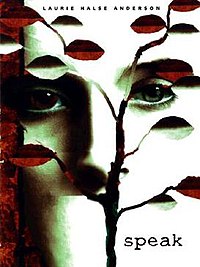★
"It's easier not to say anything. Shut your trap, button your lip, can it. All that crap you hear on TV about communication and expressing feelings is a lie. Nobody really wants to hear what you have to say."
When freshman Melinda starts high school, all of her friends want nothing to do with her because she called the police on a end-of-the-summer party. Unable to think or talk about what happened, Melinda becomes withdrawn and barely speaks to anyone. She befriends a new girl at school named Heather, but faces constant bullying from her classmates and her grades suffer. Through Melinda’s art work, she begins to find her voice and face what happened to her. Readers slowly learned the Melinda was raped at the party, leading her to call the police. At the end of the novel, Melinda begins to recreate herself and tells her art teacher what happened to her.
I first read this book in my undergraduate young adult literature course several years ago. It was a very powerful novel. I really enjoyed the style and discovering the events through Melinda’s voice as she came to terms with what happened to her. I felt that the unique diary-style was easy to relate to and liked how the author used subtle details (such showing Melinda’s grades after each term period and the titles of each section) to show what Melinda was going though. I assumed that she had been raped at the party early on in the novel, but I don’t know if I would have necessarily picked up on this if I had read it as a young teenager. I would highly recommend this book to all young adults, especially late middle school and high school girls. The novel not only gave a realistic perspective of the life of a high schooler, but also showed readers the benefits of seeking help and speaking out after a tragic situation. I believe that many young people will benefit from reading this novel.

No comments:
Post a Comment